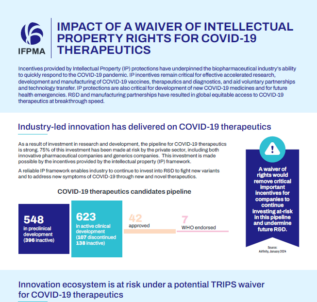Momentum of COVID-19 vaccine manufacturing scale up sufficient for step change in distribution
- This month COVID-19 vaccine manufacturing output will pass the 7.5 billion dose mark. Vaccine manufacturers worldwide are now producing 1.5 billion doses per month and this is expected to continue growing. 12 billion vaccines will be produced by the end of 2021 and if there are no major bottlenecks, by June 2022 total vaccine production is estimated to reach over 24 billion by which time vaccine supplies will most likely outstrip global demand.
- The biopharmaceutical industry continues to call for dose sharing and renew its commitment to work with governments to support their efforts. From now on, G7 countries have sufficient stocks of doses to vaccinate adults, teenagers and roll out boosters programmes to protect the most at-risk groups as well as substantially increase the number of doses available to low- and lower-middle-income countries. Political leadership is critical to enable dose deliveries as quickly as possible.
- Reducing the toll of the pandemic on lives and livelihoods requires equitable access to vaccines and country readiness for vaccination. Therapeutics are integral to COVID-19 mitigation strategies, but more testing and demand data is needed to ensure these can be rolled out equitably.
Geneva, 7 September 2021: Innovative biopharmaceutical company trade body announced that COVID-19 vaccines dose production will reach 7.5 billion at the end of September, at a rate of nearly 1.5 billion doses each month. The successful vaccine manufacturing scale up has been achieved thanks to a steady increase in production, supply chain, and voluntary tech transfer agreements with partners across the world. By January 2022, there will be sufficient vaccines produced for every adult on every continent. Modelling by Airfinity (report here) indicates that even if vaccine advisory committees and governments in G7 countries vaccinate teenagers and adults and decide to give boosters to at-risk populations, there would still be over 1.2 billion doses available for redistribution in 2021 alone. This means that each month for the foreseeable year, over 200 million doses would be, with effective planning, available for low- and lower-middle-income countries.
The historic COVID-19 manufacturing scale up should now urgently shift attention to delivering vaccine equity including dose sharing. In May 2021, the innovative biopharmaceutical industry publicly committed to expend every effort to make additional uncommitted COVID-19 doses available to low- and lower-middle-income countries (LMIC) and to support governments that have significant domestic supplies of COVID-19 vaccine doses to share a meaningful proportion of their doses with LMICs in a responsible and timely way through COVAX or other efficient established mechanisms (link here).
The new Airfinity data show that equitable redistribution of doses can be stepped up. Thanks to the steady vaccine manufacturing output, projections show it is possible to vaccinate the whole adult population of the world by June 2022. But this requires governments to strategically release doses so that vaccines leave the production lines and reach the people who need them most, from healthcare workers to vulnerable populations. Such vaccine deployment requires urgent political leadership and coordinated action to remove delivery and administration bottlenecks in many environments, especially as mRNA vaccines might make up to 40% of the additional doses available. Here again, industry stands by its commitments of May 2021, to support country readiness, and partner with governments on COVID-19 vaccine deployment, particularly in LMICs, to ensure that they are ready and able to deploy available doses within their shelf life (link here).
Even in the face of delta, current authorised vaccines show continued strong protection from infection and excellent effectiveness against hospitalisation and death. Still, for those people who do contract COVID-19 or are at-risk, treatments are an important and integral part of COVID-19 mitigation strategies. A handful of authorised COVID-19 treatments are now becoming standard of care for COVID-19 patients that have been hospitalised and are saving lives. Monoclonal antibody treatments are beginning to offer promise for outpatient treatment, as are novel antivirals. The biopharmaceutical industry and its suppliers are working on scaling up manufacturing capacity, but their effective roll out to all patients is dependent on access planning which involves allocation strategies for patients who will benefit most, testing, accurate demand and forecasting and country readiness. Getting the therapeutic roll out right will be important for all countries to be able to benefit from future innovation, such as the anticipated oral outpatient COVID-19 therapeutic candidates.
Note to Editors
Key treatments authorised for emergency use include:
- Anti-viral, Remdesivir/Gilead Sciences
- Corticosteroid, Dexamethasone
- Anti-inflamatory, Baricitinib/Eli Lilly/Natco Pharma
- Monoclonal IL-6 blocker, Tocilizumab/Roche/Genetech
- Monoclonal Casirivimab & Imdevimab/REGEN-COV Roche Regeneron
- Monoclonal Sotrovimab / GlaxoSmithKline
Some monoclonal treatments currently under development by IFPMA members:
Some antiviral treatments currently under development by IFPMA members:
- Molnupiravir/MSD/Ridgeback Therapeutics
- AT-257/Roche/Atea Pharmaceuticals
- PF-07321332/Pfizer
About IFPMA
The International Federation of Pharmaceutical Manufacturers and Associations (IFPMA) represents over 90 innovative pharmaceutical companies and associations around the world. Our industry’s almost three million employees discover, develop, and deliver medicines and vaccines that advance global health. Based in Geneva, IFPMA has official relations with the United Nations and contributes industry expertise to help the global health community improve the lives of people everywhere. For more information, visit ifpma.org.
Learn more




